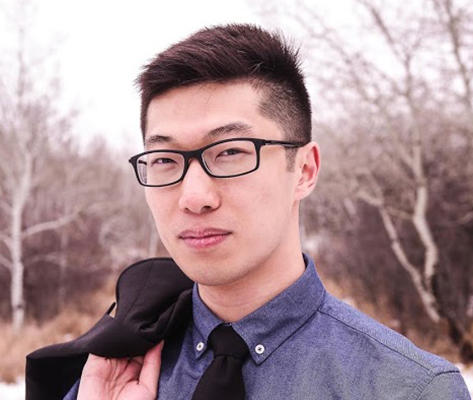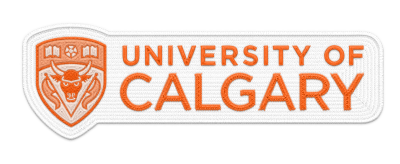Recent graduate

Where is he today?
Business Technology Analyst, Deloitte Canada, Calgary
Engineer in Training, Association of Professional Engineers and Geoscientists of Alberta
Schulich alumni Carl Wei gets down to business
Towards the end of his third year studying electrical engineering at the Schulich School of Engineering, Carl Wei was having a difficult time finding an internship. So, he decided to do the first half of his fourth-year classes while he kept looking. “I went to the internship office a lot and just talked with them,” says Wei. “Eventually, they were like, ‘Hey talk with these professors, they might have a cool job for you.”
Wei applied for the internship. “It wasn't really specified,” he says, not sure at the time about many details other than that the project was being run on campus out of the University of Calgary’s Physics and Astronomy Department.
Everything went well and he was offered the job. Once he filled out all the paperwork and cleared all the security stuff, he was told, “Hey, you’re building parts of satellites for the CSA.” He built power and control systems for a satellite instrument for the Canadian Space Agency over the next several months. “Then eventually NASA said it wanted to fund us and develop the project even more,” says Wei, who spent a total of 20 months as an intern on the project.
As Calgary-raised Wei looked ahead to graduation in December 2017, he started thinking about what he wanted to do when school – and the internship – was done. “I went out and really started networking; I made new friends and I tried to get people to introduce me to other people,” he says. “Eventually, someone said ‘Hey, have a beer with this person.’ I did, and then we talked more. They helped prepare me for an application to Deloitte, and that’s how I got the job.”
Wei started as a business technology analyst in the technology stream at Deloitte Canada in February. Soon, another interesting opportunity came up at Deloitte dealing with asset repair strategies for an oil and gas refinery in Ohio. “We categorize equipment by their failure rate and impact, and then set up proactive strategies to react to downtime,” he says. “Some of the engineering terms and the engineering mindset still applies. I was brought on as a resource to discuss electrical components in the refinery, such as motors,” he says. “A lot of the things we’re talking about are very technical.” Wei is still an engineer in training, working toward his P.Eng. designation with the Association of Professional Engineers and Geoscientists of Alberta.
“I wanted something fast-paced and to try out the business side,” says Wei, who spends five days a week in Ohio and flies home to Calgary for two days.
“I am really focused on work-life balance right now,” he says. “When I’m back in Calgary, I need time to get prepped for the week ahead and also to see friends for a brunch, lunch or dinner out, and then parties.”
When he started his engineering degree, Wei could never have imagined his job is where he’d end up – and that he’d be thrilled to have it. Or, that an unexpected internship with the CSA and NASA would help him land it. “Having that on my resume really helped,” he says. “Yeah, I think it definitely set me up for this job.”
Being an engineer sets you apart – it sets you up to have meaningful conversations, and draw on significant experiences, and solve problems.
Carl Wei
BSc (Eng)'17
How did UCalgary’s Schulich School of Engineering prepared you to be an engineer?
I never would have got my internship with the Canadian Space Agency and then NASA if I wasn’t in electrical engineering. Especially because a lot of the requirements with that had to do with designing PCBs, Printed Circuit Boards. The entire goal was to redesign a large satellite to be smaller and lower power. So I had that type of experience, and I was able to put it on my resume. And then I was able to pull experience from my Capstone project, which was also about micro-electronics. And I was able to learn from friends I made through engineering. They wanted to build computers together and play games and all that stuff. So a lot of what I learned, I learned it indirectly from all kinds of engineering experiences.
What were some of your Schulich School of Engineering highlights?
I had a group of friends from engineering, and a lot of us actually didn’t go to class together at first, but we’d help each other out. In our off-time, when we were not in class, we would just plug in together. They're like, ‘Hey I see you're doing this, teach me about this?’ Or like, ‘Hey you know this, can you teach me this, I'll teach you this?’ So that's just how it worked. We’d do stuff like design computers. I learned a lot.
Who were your UCalgary mentors?
Oh man, it's hard to answer this question because I had some good friends that were really there for me, and professors too. But Rebecca Cowan from the internship office (at the Engineering Career Centre), she helped me reach out and find opportunities to send out resumes and emails. And she helped me find my Canadian Space Agency and NASA internship, which set me up for everything. So I'm very thankful for her. I come back sometimes to volunteer for her at the University of Calgary; for example, I judged last year’s Capstone Design Fair.
What is your advice for new engineering students?
My advice is to not just focus on engineering skills. A lot of jobs right now, people are impressed with engineering degrees. But it’s about more than that; it’s about selling yourself as being personable, because at the end of the day, you are providing a user experience, right? You can't just be average at the end of your four or five years of school and expect to end up somewhere extraordinary. You have to be well-rounded.
What is your life beyond engineering?
Being in Ohio for five days and Calgary for two days every week, I’m learning the strengths and weaknesses of work-life balance right now.
What does it means to you to be an engineer?
I work more in consulting right now than in engineering. But having the status of being an engineer-in-training, I’m definitely ahead of a lot of my peers. It's one of the main reasons I was hired for the project I’m working on now. Being an engineer sets you apart – it sets you up to have meaningful conversations, and draw on significant experiences, and solve problems.
